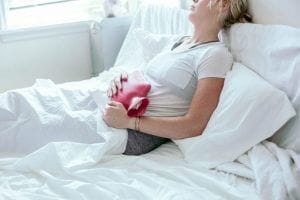Dysmenorrhea or Period Pain
Period pain can be unbearable. But painful periods do not have to be a fact of life every month. In fact, you shouldn’t need to take painkillers or any medications because of period pain. Really, you should be pretty unaware that you have your period other than the obvious flow.
What Causes Period Pain?
The most common causes of painful periods include:
- Low blood supply to the uterus
- Not enough exercise
- Emotional stress
- Endometriosis
- Hormonal imbalance
- Calcium-magnesium imbalance
Low Blood Supply
If there isn’t enough blood flow, the uterus will go into spasms.
Low levels of physical activity
There is abundant research that shows that moderate exercise helps to reduce period cramps.
Emotional stress
The physical changes that accompany emotional stress can increase muscle tension. This worsens period cramps.
Endometriosis
This condition involves the growth of uterine tissue outside of the uterus (endometriosis). This tissue changes size in response to hormonal changes. This causes it to press on nearby nerves causing intense pain.
Hormone imbalances
The usual hormone imbalance that causes period pain is estrogen dominance. This is where there is a relative increase in estrogen over progesterone. Or there are circulating chemicals (like BPA from plastic) that are behaving like estrogen in your body. As a result, this causes too much estrogen-like activity.
Imbalance of calcium and magnesium
Calcium is important in normal muscle contraction. Magnesium is vital for normal muscle relaxation. Balancing these two minerals relieves muscle tension symptoms like cramping.
Painful periods often lead to the chronic use of painkillers and anti-inflammatories. These pose potential health risks such as liver toxicity, stomach ulcers, and increased risk of clotting, heart attack, or stroke.
How to Stop Period Pain Naturally
Improve Blood Flow
Castor oil packs, stress reduction, exercise, and acupuncture all improve blood flow to your uterus.
Physical Activity
Lifestyle counseling helps you incorporate regular physical exercise into your daily routine.
Emotional Stress
Adaptogenic herbs, vitamins and minerals, and regular exercise help your body cope with stress better.
Endometriosis
Castor oil packs, acupuncture, elimination of dairy and wheat, and liver detoxification can help with endometriosis. For more information on endometriosis click here.
Hormone Imbalances
Your liver is responsible for making building blocks for new hormones. Also, it breaks down and clears out the old. If your liver is congested hormone imbalances can occur. Proper liver detoxification (not through the kits found in health food stores!) can help.
Calcium and Magnesium Imbalances
Supplementation with a properly balanced calcium and magnesium product can help relieve muscle cramping and spasms.
All of the above approaches have no inherent health risks, only health benefits. They also help to prevent hormone-related diseases such as PCOS and infertility.
For help with this or any other health problem, book an appointment here or call the clinic for more information at 416-481-0222.
by Dr. Pamela Frank, BSc(Hons), ND
Dr. Pamela has practiced as a naturopathic doctor in Toronto since 1999. She has received numerous “Best Naturopath in Toronto” awards. She is registered with the College of Naturopaths of Ontario.
Dr. Pamela Frank uses a natural treatment approach that may include acupuncture, herbal medicine, nutrition, diet, vitamins, supplements, and other natural remedies to restore balance and provide long-term resolution to almost any health problem.
Period Pain/Dysmenorrhea & Natural Treatment Research
Ginger:
Pain Med 2015; 16(12):2243-55. This meta-analysis of multiple studies found ginger had a significant effect in reducing pain in subjects with period pain. The ginger powder was used during the first 3-4 days of the menstrual cycle.
Treatment with ginger root for moderate to severe dysmenorrhea (period pain) showed a significant difference in the severity of pain compared to placebo. Source: BMC Complement Altern Med. 2012 Jul 10;12(1):92. [Epub ahead of print]
Achillea Millefolium:
Jenabi E, Fereidoony B. Effect of Achillea millefolium on relief of primary dysmenorrhea: a double-blind randomized clinical trial. J Pediatr Adolesc Gynecol . 2015: 28(5):402-4.
Acupressure:
Xu Y, Zhao W, Li T, Bu H, Zhao Z, Zhao Y, Song S. Effects of acupoint-stimulation for the treatment of primary dysmenorrhea compared with NSAIDs: a systematic review and meta-analysis of 19 RCTs. BMC Complementary and Alternative Medicine. 2017; 17:436. Acupoint stimulation is superior to NSAIDs in the treatment of period pain.
Pine Bark Significantly Reduces Period Pain
This study showed that pine bark extract reduced period pain naturally. J Reprod Med. 2008 May;53(5):338-46.
Acupuncture:
Acupuncture treatments for a period of one month were found to lead to a greater reduction in pain (69.5%) than non-steroidal anti-inflammatory drugs (52.2%). Source: Eur J Obstet Gynecol Reprod Bios, 2013 March 19
Fish oil:
Supplementation with fish oil was found to improve disease severity, reduce low back pain, abdominal pain, and frequency of ibuprofen use in girls aged 18-22 with dysmenorrhea. Source: East Mediterr Health J, 2010; 16(4): 408-13.
DISCLAIMER: The information provided here may not apply precisely to your individual situation. Diagnostic and therapeutic choices must always be tailored to the individual patient’s circumstances, and consultation with a licensed naturopathic physician should be undertaken before following any of the treatment strategies suggested on this website.

